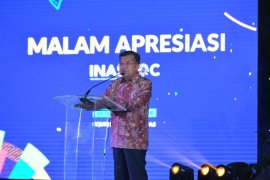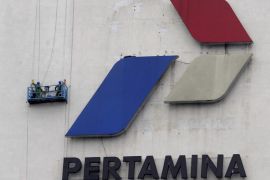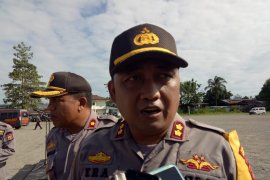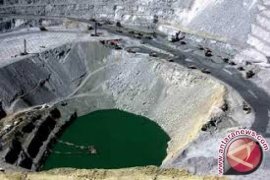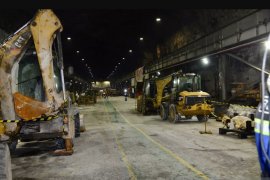"In negotiating with Freeport, the ESDM Ministry refers to and is guided by the law on mineral and coal and the Government Regulation No. 1 of 2017," Hadi M Djuraid, special staff of the ESDM Minister, said here on Thursday.
The ministrys position and stance, therefore, is to ensure that Freeport would change its contract of work (CoW) with special mining business permit (IUPK), build smelter and divest shares up to at least 51 percent to Indonesian partners, Hadi said.
"The three ports are not to be bargained for or negotiated. What we could negotiate is how it is to be implemented," he said.
Negotiation between the government and Freeport Indonesia, which has large copper and gold mines in Papua, has been deadlocked over Freeports rejection of the change of the contract to permit.
The subsidiary of the U.S. mining giant Freeport McMoRun Copper & Gold, rejected the change in its status. As a result it was forced to stop operation since early last month as it is not allowed to exports its concentrate.
CEO of Freeport McMoran Richard Adkerson said he would bring the case to an international arbitration court if no agreement reached in 120 days. The government, however, ignored the threat.
The Law No. 4 of 2009 banned exports of unprocessed minerals effective as from January, 2014 to boost development of processing industry in the country.
Hadi denied comments and reports questioning the consistency of the government in dealing with Freeport after the government announcement on Tuesday.
"In order that the public and anyone concerned, are not misled by inaccurate information, I feel it necessary to make clarification of various circulating issues," he said.
In February when negotiations began the standing positions of both sides were clear with Freeport rejecting the change in KK into IUPK and threatening to bring the dispute to an international arbitration court, he said.
Later, however, both sides agreed to resume negotiation into two phases - on short term settlement and long term settlement.
Negotiations on short term settlement will focus on the change of KK with IUPK , the result of which would be the basis for the following phase of negotiation, he said.
The IUPK would open the possibility of Freeport to operate normally in Timika that negative social economic excess could be minimized in Timika and Papua in general.
"After four weeks of negotiations , Freeport agreed to accept IUPK," he said, adding although Freeport asked for an extension of negotiation period from six to eight months as from February , 2017.
He said the ESDM Ministry agreed with the request that the remaining time since April is six month.
Six months are the remaining time for negotiation on long term solution with discussion to focus on investment stability demanded by Freeport, continuation of Freeports operation , and process of 51 percent share divestment.
In line with the Government Regulation No. 1 of 2017, IUPK holders may submit recommendation for six months exports of concentrate, on condition commitment to building smelter in five years paying export tax and divesting shares up to 51 percent in a certain period.
"The points about share divestment will be included in the negotiation on long term settlement," he said.
He said that progress in the process of construction of the smelter would be verified by independent verifies every six months.
"If the result of the verification showed that the progress of construction of the smelter was not up to the plan already approved by the ESDM Ministry, the export recommendation would be revoked.
"The regulation is effective on all IUPK holders with no exception," he said.
He said other former KK holders have complied with the procedure such as PT Amman Mineral Nusa Tenggara, formerly Newmont Nusa Tenggara.
"What is clear is, that Freeport would operate on IUPK basis in the next six months," he said.
That means the targets of the negotiations for short term settlement are already reached, including normal operation of Freeport, that negative effects on social economy could be put under control, he said.
The second phase of negotiation on long term issues would start in the second week of April on strong basis of IUPK, he added.
Negotiations would involve related institutions/agencies including the Finance Ministry, the Capital Investment Coordinating Board (BKPM), the Home Affairs Ministry, the Papua provincial administration including Timika district administration, community traditional leaders in Timika.
"If after six months agreement failed on points mentioned in the negotiations on long term settlement, Freeport Indonesian could return to its position as KK contractor, but may not export concentrate," Hadi said.
Therefore, it was not right to say that the government in this case the ESDM Ministry was not consistent with its commitment to carrying out the program to develop downstream mining industry and to strengthen the country sovereignty through the points of 51 percent share divestment, he added.(*)
Editor: Heru Purwanto
Copyright © ANTARA 2017

